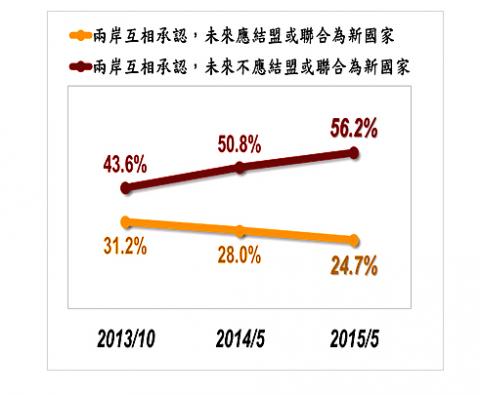More than 60 percent of respondents disagreed with Chinese Nationalist Party (KMT) Chairman Eric Chu’s (朱立倫) comment that “both sides of the Taiwan Strait belong to ‘one China,’” a poll released yesterday by Taiwan Indicators Survey Research showed, while only 26.7 percent agreed with the statement.
Chu made the comments during a meeting with Chinese President Xi Jinping (習近平) in Bejiing on May 4. Chu later said that the “one China” he spoke of referred to the Republic of China (ROC), not the People’s Republic of China (PRC).
Asked whether Taiwan and China belong to “one China,” 61.6 percent of respondents opposed the idea, 26.7 percent were in favor and 11.7 percent said they had no opinion on the matter or were neutral, the poll showed.

Image provided by TISR
The survey showed that 41.2 percent of respondents said that the talks in Beijing were more favorable to China, while 15.7 percent said they favored Taiwan.
The poll asked: “In the event of Taiwan and China mutually recognizing each other as rightful governments, should both sides enter into an alliance as two nations or merge and become a single country?”
Among respondents, 56.2 percent opposed an alliance, while 24.7 percent supported the idea and 19.1 percent said they had no opinion on the matter.
An analysis of the poll results showed that among pan-blue supporters, 47.5 percent opposed an alliance, while 42.7 percent supported the notion.
When asked who among Chu, Legislative Speaker Wang Jin-pyng (王金平) and Vice President Wu Den-yih (吳敦義) — seen as potential KMT nominees for next year’s presidential election — would best preserve Taiwanese sovereignty, prioritize Taiwan’s safety and maintain cross-strait relations, Wang was ranked No. 1 by 36.9 percent of respondents, Chu was backed by 26.5 percent and Wu by 4.9 percent, while 12.8 percent said that none of the three would meet their expectations, 1.3 percent said all three were up to the task and 17.6 percent did not respond or said they did not know.
The survey was conducted on Monday and Tuesday.
It collected 1,004 valid samples from people aged 20 or above. It has a margin of error of 3.1 percentage points.

INVESTIGATION: The case is the latest instance of a DPP figure being implicated in an espionage network accused of allegedly leaking information to Chinese intelligence Democratic Progressive Party (DPP) member Ho Jen-chieh (何仁傑) was detained and held incommunicado yesterday on suspicion of spying for China during his tenure as assistant to then-minister of foreign affairs Joseph Wu (吳釗燮). The Taipei District Prosecutors’ Office said Ho was implicated during its investigation into alleged spying activities by former Presidential Office consultant Wu Shang-yu (吳尚雨). Prosecutors said there is reason to believe Ho breached the National Security Act (國家安全法) by leaking classified Ministry of Foreign Affairs information to Chinese intelligence. Following interrogation, prosecutors petitioned the Taipei District Court to detain Ho, citing concerns over potential collusion or tampering of evidence. The

‘FORM OF PROTEST’: The German Institute Taipei said it was ‘shocked’ to see Nazi symbolism used in connection with political aims as it condemned the incident Sung Chien-liang (宋建樑), who led efforts to recall Democratic Progressive Party (DPP) Legislator Lee Kun-cheng (李坤城), was released on bail of NT$80,000 yesterday amid an outcry over a Nazi armband he wore to questioning the night before. Sung arrived at the New Taipei City District Prosecutors’ Office for questioning in a recall petition forgery case on Tuesday night wearing a red armband bearing a swastika, carrying a copy of Adolf Hitler’s Mein Kampf and giving a Nazi salute. Sung left the building at 1:15am without the armband and apparently covering the book with a coat. This is a serious international scandal and Chinese

Seventy percent of middle and elementary schools now conduct English classes entirely in English, the Ministry of Education said, as it encourages schools nationwide to adopt this practice Minister of Education (MOE) Cheng Ying-yao (鄭英耀) is scheduled to present a report on the government’s bilingual education policy to the Legislative Yuan’s Education and Culture Committee today. The report would outline strategies aimed at expanding access to education, reducing regional disparities and improving talent cultivation. Implementation of bilingual education policies has varied across local governments, occasionally drawing public criticism. For example, some schools have required teachers of non-English subjects to pass English proficiency

TRADE: The premier pledged safeguards on ‘Made in Taiwan’ labeling, anti-dumping measures and stricter export controls to strengthen its position in trade talks Products labeled “made in Taiwan” must be genuinely made in Taiwan, Premier Cho Jung-tai (卓榮泰) said yesterday, vowing to enforce strict safeguards against “origin laundering” and initiate anti-dumping investigations to prevent China dumping its products in Taiwan. Cho made the remarks in a discussion session with representatives from industries in Kaohsiung. In response to the US government’s recent announcement of “reciprocal” tariffs on its trading partners, President William Lai (賴清德) and Cho last week began a series of consultations with industry leaders nationwide to gather feedback and address concerns. Taiwanese and US officials held a videoconference on Friday evening to discuss the